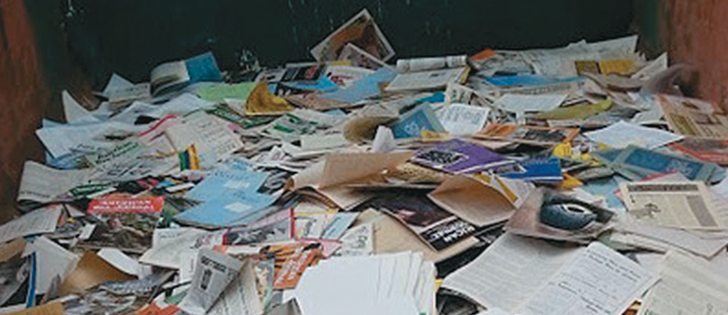Dumpsters were full of books, reports and other paper at Agriculture Canada’s Lethbridge Research Centre two weeks ago when the centre’s library was dismantled and its materials discarded.
The move was criticized by the Professional Institute of the Public Service of Canada as further evidence of the Conservative government’s “war on science.”
The union, which has members who work at the research centre, said the library’s destruction is the 16th federal science library lost since 2012 because of federal cuts to programs and services.
Read Also

Government, industry seek canola tariff resolution
Governments and industry continue to discuss how best to deal with Chinese tariffs on Canadian agricultural products, particularly canola.
“For the Lethbridge research community, it’s a catastrophe,” said union communications officer Johannes Fillion.
She said the union was contacted by researchers from the Lethbridge centre who were concerned about the lost materials. Some of them took photos of library material in dumpsters.
“They are not allowed to speak against their employer,” said Fillion, so they contacted the union to speak on their behalf.
Agriculture Canada media relations officer James Watson said researchers evaluated the Lethbridge library, and all unique and relevant documents were relocated. They will be available for loan.
Items deemed irrelevant, as well as duplicates, were offered to employees, who retained more than 1,000 items, Watson said in an emailed response to Western Producer queries.
“Traditional library services are changing, and there is a global movement towards a greater use of electronic and digital resources. As part of this transformation, AAFC is moving towards services being delivery virtually and as a self-service feature,” Watson said in an email.
“The established Government of Canada retention policy and procedures were strictly adhered to in the completion of the exercise to consolidate the Lethbridge Research Centre library collection.”
Fillion said the amount of material converted to digital format is not known, nor is the criteria used to determine what information was relevant and therefore retained.
“It’s unique research you can find only in one place and not everything could be digitalized, and not everything would be made available for the research community,” she said.
“For the research community, it’s not just a public research community, it’s also the universities connecting to such ground research, it’s also the college, it’s also some programs, it’s also the technicians, it can be also the companies. Who will get access to all the information?”
The union likened the Agriculture Canada library losses to those at the department of fisheries and oceans several years ago, where it said important historical information was lost.
At the time, the government said budget cuts were part of the reason, but the union said cost savings are unlikely in this case.
“In terms of the big envelope of spending envelopes, these small research libraries aren’t expensive to run,” said Fillion.
“They collect their own information, they have a couple of subscriptions and its mainly research documents they’ve been keeping for years. There is an historical background to it and often an artifact aspect to it.”
Watson said the former Lethbridge library space will be repurposed, but specifics will depend on need. As an example, desk and computer activities now in laboratories could be moved there to free up more space in the labs.
“The remaining physical collections will continue to be available across the country, as will an expanded amount of digital information. AAFC’s library service is not closing.”
National Farmer’s Union president Jan Slomp denounced what his group termed “libricide.”
“It’s not a surprise, what the Conservative government has done over the last nine years, but it is actually shocking that we have that much disregard for history and disregard for essential research,” said Slomp.
“The general trend in this is to eliminate whatever is … commercially not attractive.”
The NFU published a list this spring of public institutions and programs cancelled by the federal government, which it described as “turning off the lights that illuminate Canada.”
Among those listed were the beef production unit at Brandon, the fisheries and oceans habitat management program, the Kamloops range research unit and various specialized libraries.
Rachael Harder, the federal Conservative candidate in the Lethbridge riding, said changes at the research centre constitute progress.
“The truth is, scientific research, we participate in it for the sake of advancement. Its purpose is to lead to greater innovation, greater creativity, new technologies. Science is meant to lead to modernization, effectiveness, efficiency within the way we live and work and play.
“And so in the same way, it would make sense then that the library that supports our researchers and scientists should do the same. By closing the library at the Lethbridge Research Station, the Government of Canada has simply turned its attention to modernization, which means that all of those documents that were once in print form are now being digitalized.”
Contact barb.glen@producer.com


















